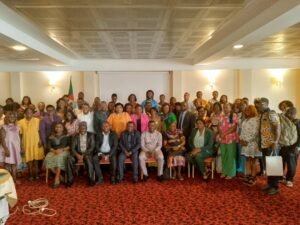 Nairobi, August 26 2016- The TICAD VI side event on “Accountability for Sexual and Reproductive Health: A call to Action, organized by The African Union and the International Planned Parenthood Federation took place on 26 August 2016 at the Kenyatta International Convention Center (KICC).
Nairobi, August 26 2016- The TICAD VI side event on “Accountability for Sexual and Reproductive Health: A call to Action, organized by The African Union and the International Planned Parenthood Federation took place on 26 August 2016 at the Kenyatta International Convention Center (KICC).
In his key note address, Mr. Tewodros Melesse, IPPF Director General highlighted the African Union Commission’s Agenda 2063, and the 2030 development agenda -the SDGs, which promote universal responsibility and accountability in the global agenda. He recalled and applauded the timely decision of the African Union to focus on the youth, who constitute 70% of the population, and underlined the need to invest in this group, who are key determinants to Africa’s development.
Mr. Melesse indicated that transparency and accountability of CSOs and governments towards citizens with regard to Sexual Reproductive Health (SRH) is essential. He further indicated that the revised Maputo Plan of Action (MPoA) or the Agenda 2063 should not only be discussed among bureaucrats, but should be translated into languages that are easily understood by the people.
Dr. Mustapha Sidiki Kaloko, Commissioner for Social Affairs at the African Union Commission (AUC) affirmed the political will demonstrated in the last two decades towards the improvement of Sexual Reproductive Health needs of women, youth and adolescents in the continent. This has been demonstrated in score cards and health statistics which are available to the public. Dr. Kaloko recalled that the political commitments were gained through well-drawn and executed campaigns, such as the CARMMA –which was launched by the AUC in 2009 to reduce maternal mortality and morbidity. He further indicated that since 2011, the Commission has strengthened its monitoring mechanisms, citing examples such as the African peer mechanism review and score cards on Maternal, Newborn and Child Health (MNCH), which showed the commitment of the Commission to accountability mechanisms.
Dr. Nicholas Muraguri, Principal Secretary at the Ministry of Health of Kenya stressed on the fundamental role of accountability mechanism for SRHR. Dr. Muraguri indicated that Kenya has passed a number of legislations that promote the rights of women, and has signed all national and international treaties that guarantee maternal, child and adolescent health. He made reference to the Beyond Zero Campaign, championed by Kenya’s First Lady H.E Margaret Kenyatta, which continues to promote Sexual Reproductive Health as a community issue. Dr. Muraguri emphasized on the need to seek accountability, and for communities and Civil Society Organizations (CSOs) to demand the implementation of commitments endorsed by their countries.
Hon. Marie Rose Nguini-Effa, a Member of Parliament from Cameroon highlighted the important role of parliamentarians in terms of enacting laws and following up on their implementation. She indicated that parliamentarians need healthy people who are able to elect them, and that parliamentarians have to be educated about SRH. To this end, Hon Nguini-Effa called upon the AUC, IPPF and other non-state actors, including CSOs, to work together with parliamentarians to promote SRH in the continent.
IPPF and AUC collaborate closely to advance SRHR in the continent. IPPF was a key partner in the drafting process of the revised Maputo plan of Action (MPoA) for the operationalization of the Continental Policy Framework for Sexual Reproductive Health.
Source: Maryanne Waweru-Wanyama(IPPFAR)





